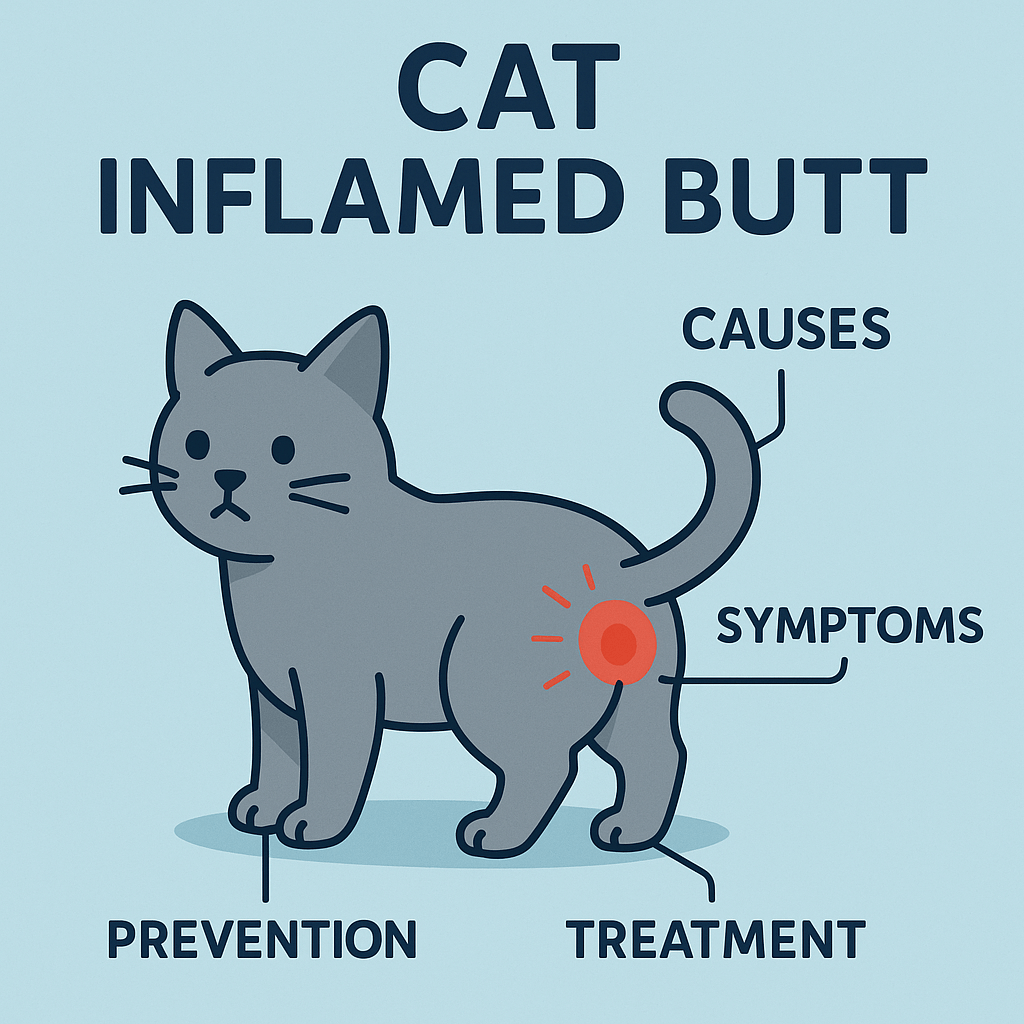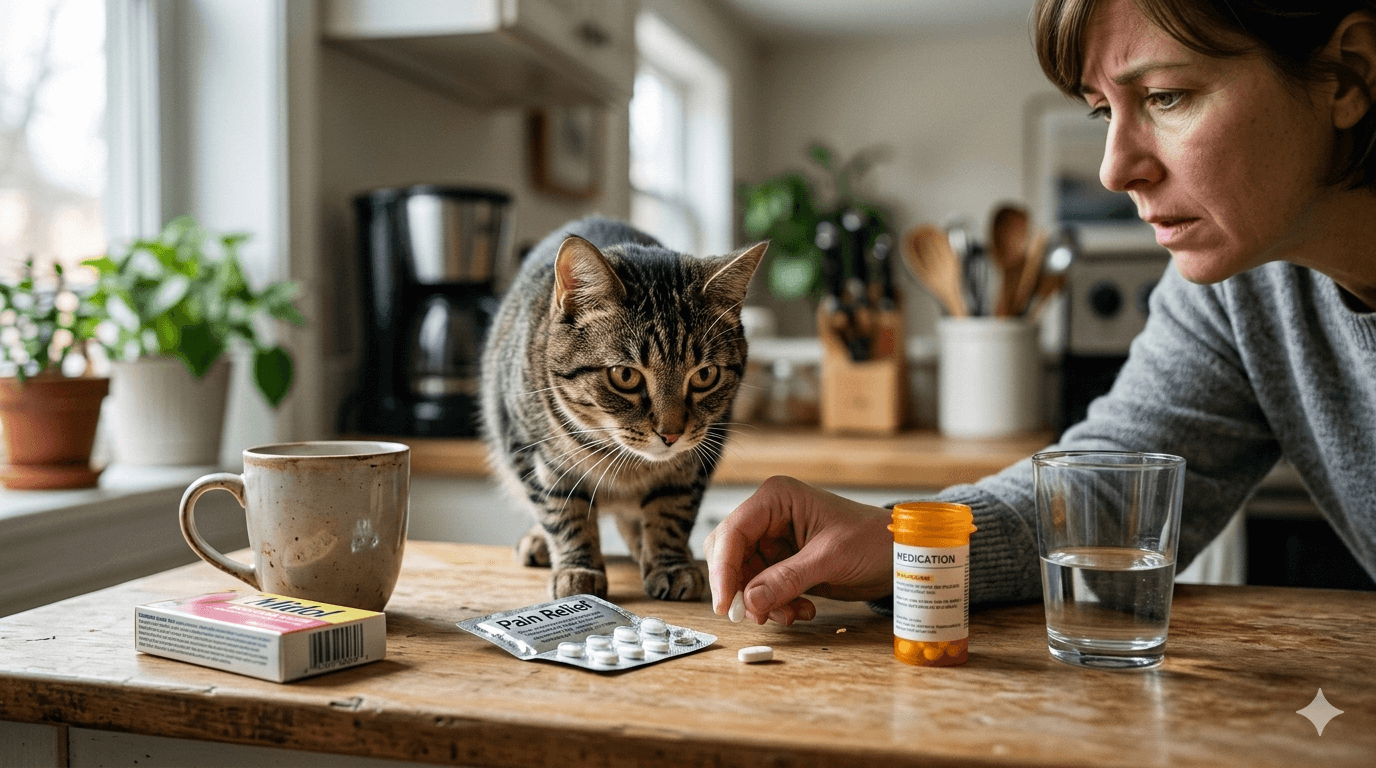Understanding Cat Inflamed Butt: Causes, Symptoms, and Solutions
If you’ve noticed your cat frequently licking or scooting their rear end, they may be dealing with an inflamed butt—a condition that can stem from a variety of causes. While it might seem like a minor issue, inflammation in this area can indicate underlying health problems that require attention. From allergies to infections, understanding the potential triggers and symptoms is crucial for ensuring your feline friend stays comfortable and healthy. This blog post will explore everything you need to know about cat inflamed butt, including how to identify it, treat it, and prevent future occurrences. Let’s dive into the details to help your cat feel their best again.
Expert Insight on Proctitis in Cats
“The rectum is the last part of the colon, where stool is stored until a cat has a bowel movement and the stool passes through the opening to the outside (the anus). If the rectum or anus becomes inflamed, it’s called proctitis.”
Common Causes of an Inflamed Butt in Cats
An inflamed butt in cats can result from a range of factors, each requiring different approaches to treatment. Identifying the root cause is the first step toward addressing the issue effectively.
Allergies:
Food or environmental allergies can lead to irritation around the anal area, causing redness and discomfort.Parasites:
Fleas, ticks, or worms such as tapeworms can irritate your cat’s skin and contribute to inflammation.Anal Gland Issues:
Impacted or infected anal glands often cause swelling and discomfort in the rear end.Infections:
Bacterial or fungal infections can result in inflammation, accompanied by signs like discharge or odor.Poor Hygiene:
A lack of regular cleaning, especially in long-haired cats, can lead to irritation and inflammation.
By pinpointing the cause of your cat’s inflamed butt, you can take targeted steps to alleviate their discomfort and restore their well-being.

Signs Your Cat May Have an Inflamed Butt
Recognizing the symptoms of an inflamed butt is essential for early intervention. Keep an eye out for these telltale signs that something might be wrong.
Excessive Licking or Chewing:
If your cat is obsessively grooming their rear end, it could indicate irritation or pain.Scooting Behavior:
Cats dragging their bottom across the floor are likely trying to relieve discomfort.Redness or Swelling:
Visible inflammation around the anus is a clear sign something is amiss.Foul Odor:
An unusual smell emanating from your cat’s rear end may signal an infection or impacted anal glands.Changes in Behavior:
Restlessness, aggression, or reluctance to sit comfortably can all point to an inflamed butt.
Being observant and proactive can help you address the issue before it worsens, ensuring your cat remains happy and healthy.
Check this guide 👉Top 5 Best Cat Butt Wipes for Ultimate Feline Hygiene!
Check this guide 👉Why Do Cats Show You Their Butt? Best 7 Expert Tips!
Check this guide 👉Why Does My Cat Put His Butt in My Face? Best 7 Tips!
Preventive Measures for Cat Inflamed Butt | Treatment Options for Inflamed Butt |
|---|---|
Regular grooming and hygiene maintenance | Veterinary-prescribed antibiotics |
Providing a balanced, hypoallergenic diet | Anal gland expression by a professional |
Keeping your cat free of parasites | Anti-inflammatory medications |
Monitoring for signs of allergies | Warm compresses for mild cases |
Scheduling routine vet check-ups | Dietary adjustments for digestive issues |
How to Prevent an Inflamed Butt in Cats
Prevention is always better than cure when it comes to your cat’s health. Taking proactive measures can significantly reduce the risk of an inflamed butt.
Maintain Proper Hygiene:
Regularly clean your cat’s rear end, especially if they have long hair that could trap dirt or feces.Provide a Balanced Diet:
Feed your cat high-quality food that supports digestive health and reduces the likelihood of irritation.Control Parasites:
Use flea and tick prevention products and deworm your cat regularly to keep parasites at bay.Monitor for Allergies:
Pay attention to any changes in your cat’s behavior or skin condition after introducing new foods or products.Schedule Routine Vet Visits:
Regular check-ups allow your vet to catch potential issues early and provide guidance on maintaining your cat’s health.
By incorporating these practices into your routine, you can minimize the chances of your cat developing an inflamed butt.
When to Visit the Vet for an Inflamed Butt
While some cases of an inflamed butt can be managed at home, others require professional veterinary care. Knowing when to seek help ensures your cat receives the appropriate treatment.
Persistent Symptoms:
If redness, swelling, or discomfort doesn’t improve within a few days, consult your vet.Bleeding or Discharge:
Any signs of blood or unusual discharge warrant immediate attention.Behavioral Changes:
Sudden lethargy, loss of appetite, or aggression may indicate a more serious underlying issue.Recurring Problems:
Frequent flare-ups suggest a chronic condition that needs diagnosis and management.Difficulty Defecating:
Straining or crying during bowel movements could point to a blockage or infection.
Prompt veterinary care can prevent complications and ensure your cat gets the relief they need.
Home Remedies for Mild Cases
For minor cases of an inflamed butt, home remedies can provide relief. However, always consult your vet before trying these solutions to ensure they’re safe for your cat.
Warm Compresses:
Apply a warm, damp cloth to the affected area to reduce swelling and soothe irritation.Coconut Oil:
A small amount of organic coconut oil can moisturize dry or irritated skin, but use sparingly to avoid ingestion risks.Oatmeal Baths:
Diluted oatmeal solutions can calm itching and inflammation when applied gently to the rear end.Probiotic Supplements:
Adding probiotics to your cat’s diet may improve digestion and reduce anal gland issues.Trimming Hair Around the Area:
For long-haired cats, trimming the fur around the anus prevents matting and trapped debris.
These remedies can offer temporary relief, but persistent symptoms should always be evaluated by a vet.
Importance of Anal Gland Health
The anal glands play a key role in your cat’s comfort and hygiene. Understanding their function and potential problems helps you address issues promptly.
What Are Anal Glands?
Small sacs located near the anus that secrete a fluid used for territorial marking.Signs of Impaction:
Scooting, licking, or a fishy odor may indicate impacted anal glands.Causes of Anal Gland Problems:
Obesity, poor diet, and chronic diarrhea can contribute to gland dysfunction.Professional Expression:
A vet or groomer can safely express impacted glands to relieve discomfort.Dietary Adjustments:
High-fiber diets can promote regular bowel movements, reducing strain on the glands.
Maintaining anal gland health is vital for preventing recurring inflammation and discomfort.
Managing Stress-Related Inflammation
Stress can exacerbate inflammation in cats, including around the anal area. Addressing stressors in your cat’s environment promotes overall well-being.
Identify Stress Triggers:
Loud noises, new pets, or changes in routine can make your cat anxious.Create a Safe Space:
Provide a quiet, cozy area where your cat can retreat when feeling overwhelmed.Interactive Playtime:
Engaging your cat in play reduces stress and encourages natural behaviors.Use Calming Products:
Pheromone diffusers or calming sprays can help soothe anxious cats.Stick to a Routine:
Consistency in feeding, play, and sleep schedules reassures your cat and minimizes stress.
By managing stress, you can reduce its impact on your cat’s physical health, including inflammation.
Frequently Asked Questions About Cat Inflamed Butt
What causes an inflamed butt in cats?
Common causes include allergies, parasites, infections, and anal gland issues.
Can I treat my cat’s inflamed butt at home?
Mild cases can often be managed with hygiene and dietary adjustments, but severe symptoms require vet care.
How do I clean my cat’s rear end safely?
Use a damp cloth or pet-safe wipes to gently clean the area without irritating the skin.
Are certain breeds more prone to this issue?
Long-haired breeds are more susceptible due to their increased risk of matting and trapped debris.
What should I feed my cat to prevent irritation?
Opt for hypoallergenic or easily digestible foods that support gut and skin health.
Keeping Your Cat Comfortable and Healthy
An inflamed butt in cats may not be the most glamorous topic, but it’s an important one for ensuring your pet’s overall well-being. By understanding the causes, recognizing the symptoms, and taking preventive measures, you can help your cat avoid discomfort and stay happy. Remember, your veterinarian is always your best resource for diagnosing and treating persistent issues. With a little care and attention, you can keep your feline friend feeling their best—and enjoying life to the fullest.
Can I Give My Cat Midol? Best 7 Expert Tips! – Learn the risks, symptoms, and safe alternatives to keep your cat healthy and avoid toxic reactions.
Can I Give My Dog Midol? Best 7 Expert Tips! – Discover the risks, safe alternatives, and expert advice to keep your dog safe from accidental poisoning.
Maximum Weight for Cats on Planes: Best 7 Expert Tips! – Learn airline policies, tips to stay compliant, and ensure safe travels for your feline friend.
Max Weight for Dogs on Planes: Best 7 Expert Tips! – Discover airline weight limits, safe travel tips, and solutions for flying with your dog stress-free.




